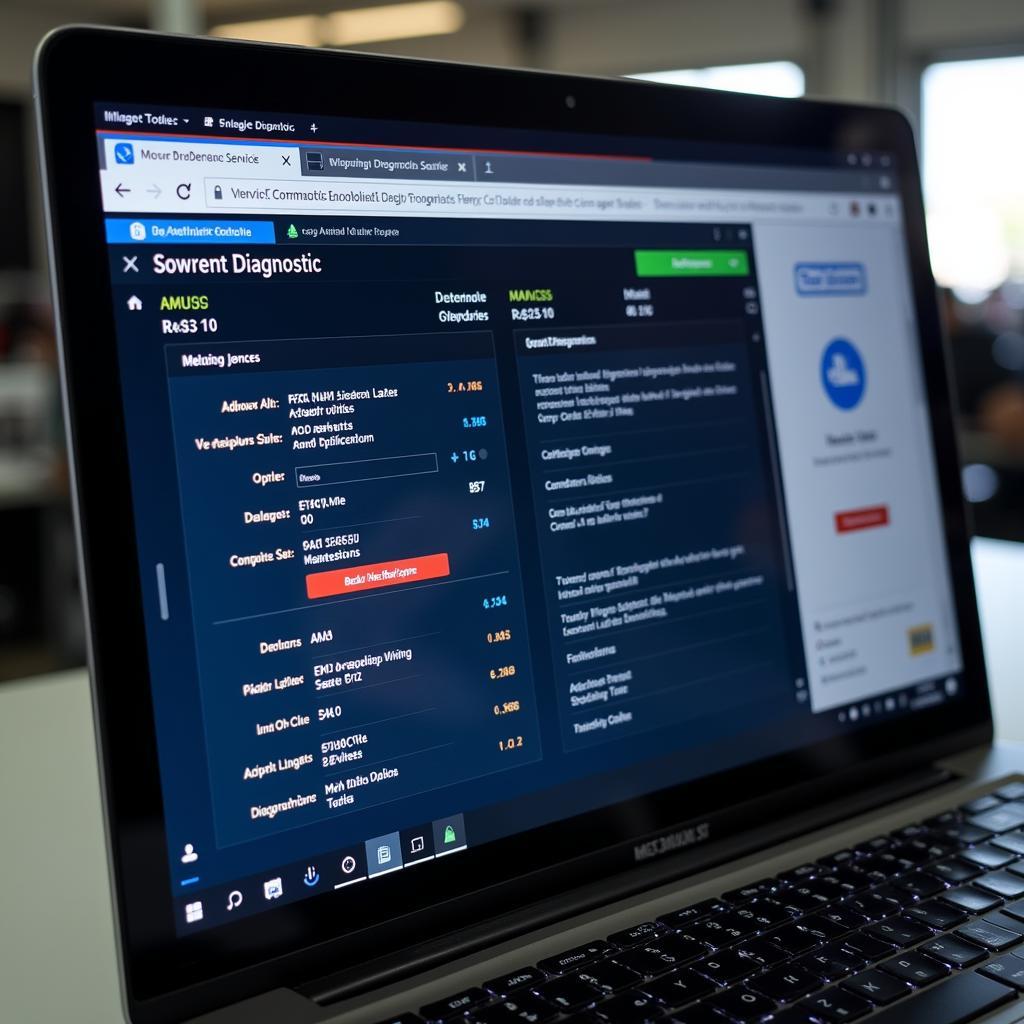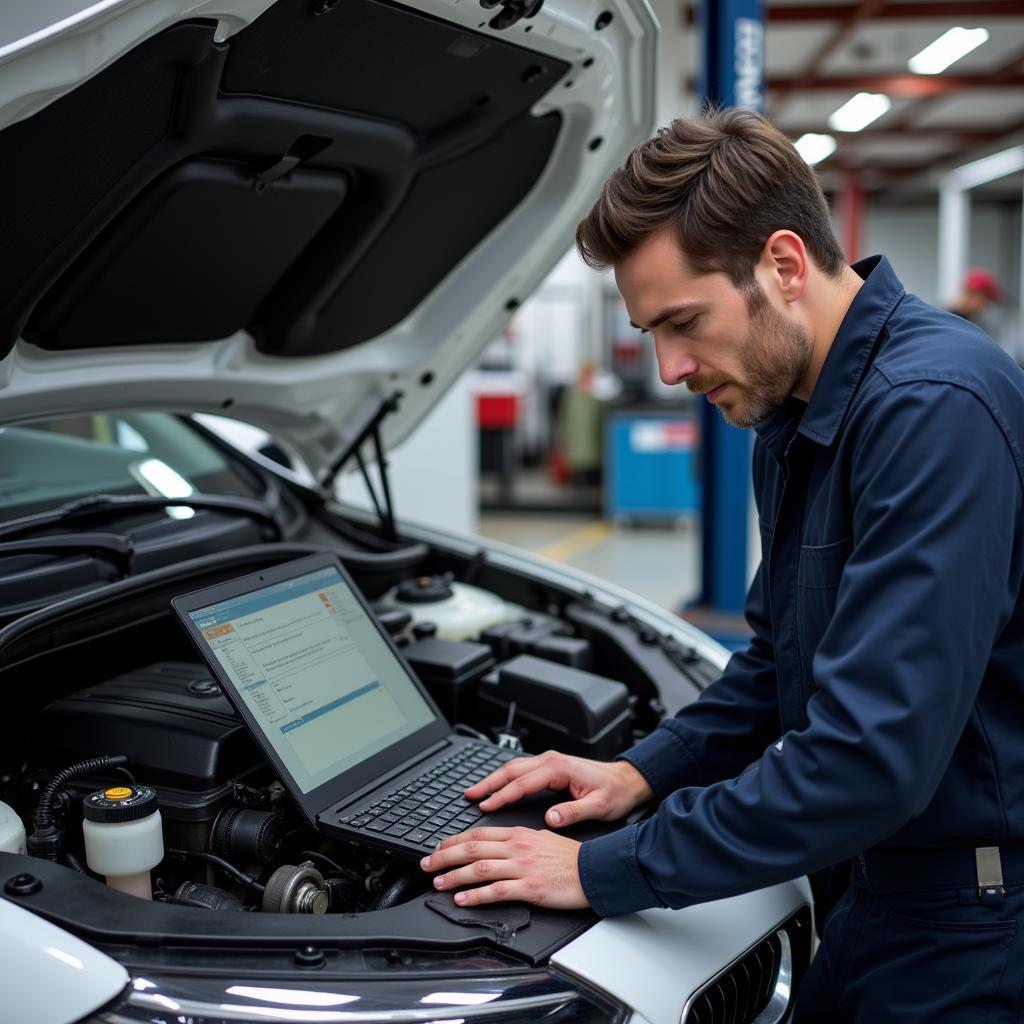Finding the best laptop for car diagnostics can feel like navigating a maze of technical specs and confusing jargon. Whether you’re a seasoned mechanic or a DIY enthusiast, having the right tool for the job can make all the difference in diagnosing and fixing car issues efficiently. This comprehensive guide will break down everything you need to know to make an informed decision and find the perfect laptop to suit your specific car diagnostic needs.
Understanding Your Car Diagnostic Needs
Before diving into the world of laptops, it’s crucial to assess your individual requirements. Ask yourself these key questions:
- What type of vehicles will I be working on? Different car models and makes may require specific diagnostic software and hardware compatibility.
- What diagnostic software do I plan to use? Research the system requirements of your preferred software to ensure the laptop can handle it smoothly.
- What is my budget? Laptops for car diagnostics can range in price, so set a realistic budget beforehand.
- Will I be using the laptop for other purposes? If you plan to use the laptop for tasks beyond car diagnostics, consider features like screen size, weight, and battery life.
Essential Laptop Features for Car Diagnostics
Not all laptops are created equal when it comes to car diagnostics. Here are the crucial features to prioritize:
Processing Power and RAM
A fast processor and ample RAM ensure smooth operation of demanding diagnostic software, especially when dealing with complex data streams and multiple applications running simultaneously. Look for laptops with at least an Intel Core i5 processor or AMD equivalent and a minimum of 8GB RAM for optimal performance.
Operating System Compatibility
Most car diagnostic software runs on Windows operating systems. Ensure the laptop you choose has a compatible Windows version, preferably Windows 10 or 11, to avoid any software compatibility issues.
 Car diagnostic software interface displayed on a laptop screen
Car diagnostic software interface displayed on a laptop screen
Durable Build and Port Selection
Garages and workshops can be harsh environments. Opt for a laptop with a rugged build quality that can withstand accidental bumps, drops, and exposure to dust or fluids. Additionally, prioritize laptops with multiple USB ports, an HDMI port, and an Ethernet port for connecting to various diagnostic tools and external devices.
Battery Life and Portability
If you’re constantly on the move, a laptop with long battery life is essential. Look for models that offer at least 6-8 hours of battery backup on a single charge. A lightweight and compact design will also enhance portability.
Top Considerations for Choosing the Best Laptop
Now that you know the essential features, let’s explore some additional factors to guide your decision:
Display Quality
A clear and bright display is crucial for reading diagnostic data, analyzing graphs, and viewing wiring diagrams. Look for laptops with a screen size of at least 14 inches and a resolution of 1920×1080 (Full HD) or higher for optimal viewing comfort.
Storage Options
Car diagnostic software and data logs can consume a significant amount of storage space. Consider laptops with a solid-state drive (SSD) for faster boot times, quicker data access, and improved overall performance. An SSD with at least 256GB of storage should suffice for most users.
Wireless Connectivity
Seamless connectivity is essential for downloading software updates, accessing online repair manuals, and troubleshooting problems remotely. Ensure the laptop you choose has reliable Wi-Fi capabilities and Bluetooth for connecting to wireless diagnostic tools.
 Mechanic using a laptop for car diagnostics in a garage
Mechanic using a laptop for car diagnostics in a garage
FAQs
What is the best laptop for professional car diagnostics?
For professional use, consider high-end laptops with powerful processors (Intel Core i7 or AMD Ryzen 7), ample RAM (16GB or more), dedicated graphics cards, and large SSDs. Look for models specifically designed for rugged environments and ensure compatibility with your preferred diagnostic software.
Can I use a Mac for car diagnostics?
While some car diagnostic software is available for macOS, Windows-based laptops offer wider compatibility and support for a broader range of tools and applications.
Do I need a touch screen laptop for car diagnostics?
While not mandatory, a touch screen can enhance usability by allowing you to navigate diagnostic software interfaces and input data more intuitively.
How often should I upgrade my car diagnostic laptop?
Consider upgrading your laptop every 3-5 years or sooner if you experience performance issues or encounter compatibility problems with newer software or diagnostic tools.
Where can I find reliable reviews of car diagnostic laptops?
Reputable tech websites, automotive forums, and online retailers often feature comprehensive reviews and comparisons of laptops suitable for car diagnostics.
Conclusion
Choosing the best laptop for car diagnostics involves carefully considering your specific needs, budget, and the essential features that will enhance your diagnostic capabilities. By prioritizing processing power, RAM, operating system compatibility, durability, and other key factors, you can invest in a reliable tool that streamlines your workflow and empowers you to tackle any automotive challenge with confidence.
Need help finding the perfect car diagnostic software? Check out our comprehensive reviews of the best car diagnostics software and the best car diagnostic software 2018 for informed decisions. For personalized guidance and expert advice, contact our team via WhatsApp at +1(641)206-8880 or email us at [email protected]. We’re here to assist you 24/7.

Leave a Reply